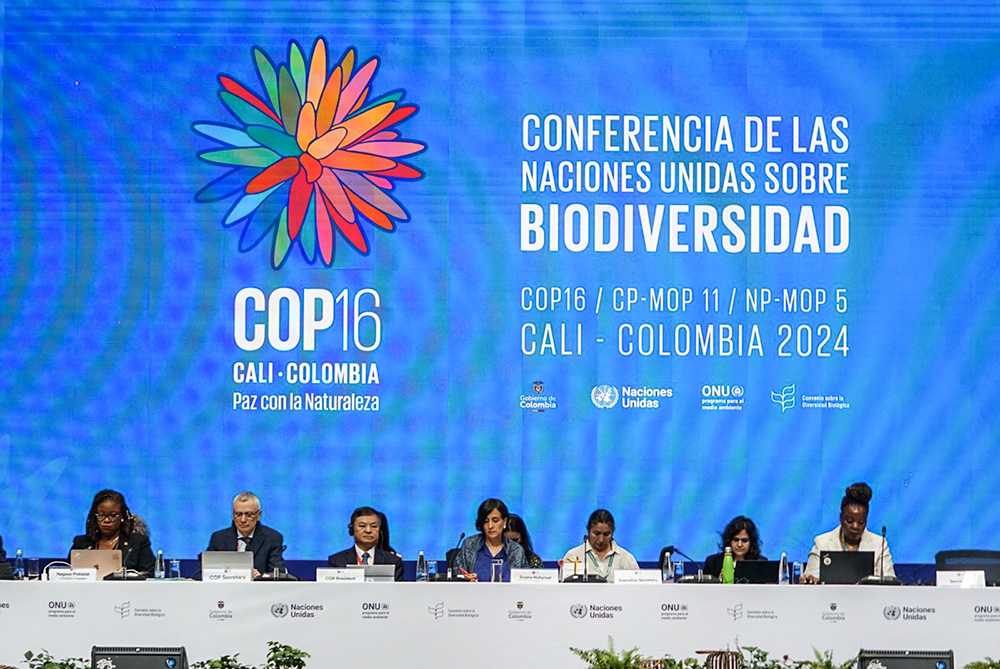
The United Nations biodiversity summit, known as COP16, is being held in Cali, Colombia. The international meeting is the first since countries in 2022 adopted a landmark deal aimed at halting and reversing the loss of biodiversity and ecosystems around the globe. (Flickr/UN Biodiversity)
Two years after reaching a global agreement to halt and reverse rapid biodiversity loss and ecosystem collapse, countries are convening in Colombia this week to continue mapping out how exactly they'll do it.
Among 23,000 delegates attending the latest United Nations biodiversity summit, known as COP16, is a coalition of faith groups who say they aim to bring moral clarity and pastoral pressure to the proceedings and to parcel out a larger space, and voice, for religion in conservation efforts at a critical juncture for the planet.
"We're walking into this conference with a true sense of urgency and ... a moral authority to push for a reversal of ecological sins," said Blair Nelsen, executive director of Waterspirit, an ecological ministry of the Sisters of St. Joseph of Peace.
"We can't have peace with each other without having peace with the Earth," said Nelsen, who is attending the summit. "We can't have flourishing communities of life without harmonious relationships with the community of life and with the planet."
COP16 began Oct. 20 in Cali, a city in western Colombia known as the country's rumba capital. The 12-day conference convened by the U.N. Convention on Biological Diversity (CBD) is focused on next steps after 195 nations adopted in December 2022 the Kunming-Montreal Global Biodiversity Framework.
That landmark agreement included a central goal for countries to conserve at least 30% of lands and waters by 2030. With that target just over five years away, and dangerous ecological tipping points on the horizon, there's an urgency for nations to act swiftly, activists say, through enacting conservation plans and mobilizing billions in financing by next year.
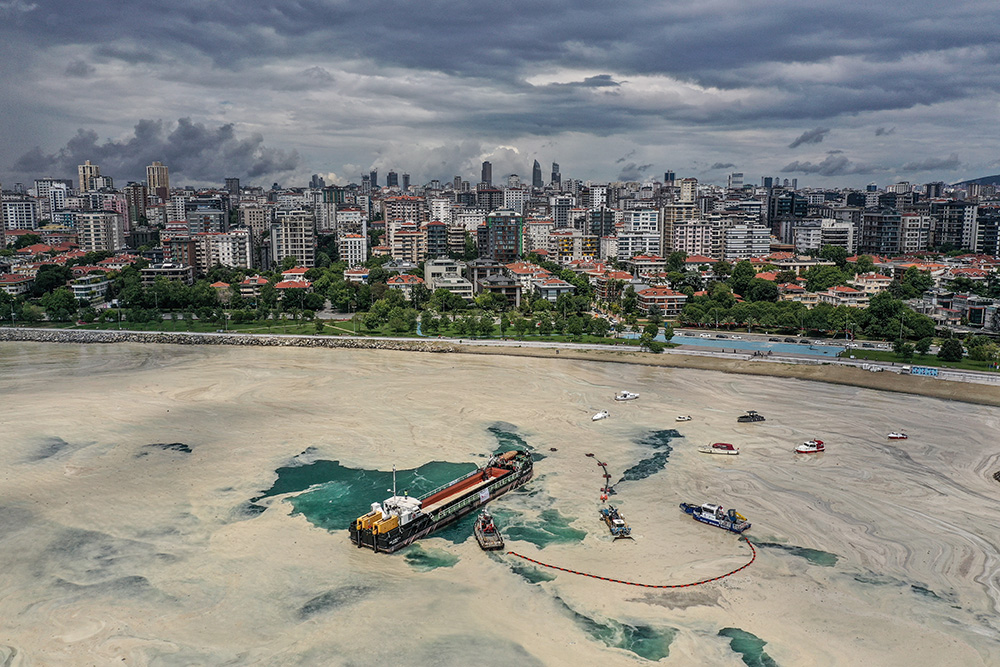
Sea-surface-cleaning vessels and barrier-laying boats of Istanbul clean up sea snot June 15, 2021. The thick slimy layer of the organic matter, also known as marine mucilage, is spreading through the Sea of Marmara and posing a threat to marine life and the fishing industry. (CNS/Reuters/Umit Bektas)
A deal to preserve nature
The Kunming-Montreal Global Biodiversity Framework has been hailed as a milestone likened to a "Paris Agreement for nature." Its four central goals and 23 related targets together are directed at restoring natural ecosystems by 2050 after decades of destruction, and ultimately bringing about greater harmony between humanity and the rest of the created world.
Today, biodiversity is at a perilous stage.
As many as 1 million species are at risk of extinction by the end of the century. Deforestation is rising, with nearly 16 million acres lost in 2023, of which 3.5 million acres were in key biodiversity areas.
Currently, less than 3% of the world's oceans are considered effectively protected, and just 14 countries so far have placed at least 30% of their waters into designated protected areas.
Meanwhile, mining and extractive industries have decimated ecosystems, and rising temperatures primarily from burning fossil fuels are melting glaciers, heating oceans and pushing coral reefs to the brink, and diminishing ecosystems critical to combating climate change.
A new report from 10 ecological groups found that major banks have financed $395 billion to 300 companies in six sectors — beef, palm oil, pulp and paper, rubber, soy and timber — that are responsible for most deforestation and human rights abuses in the world's tropical forests.
COP16 is the next step in international efforts to attempt to halt and reverse those trends.
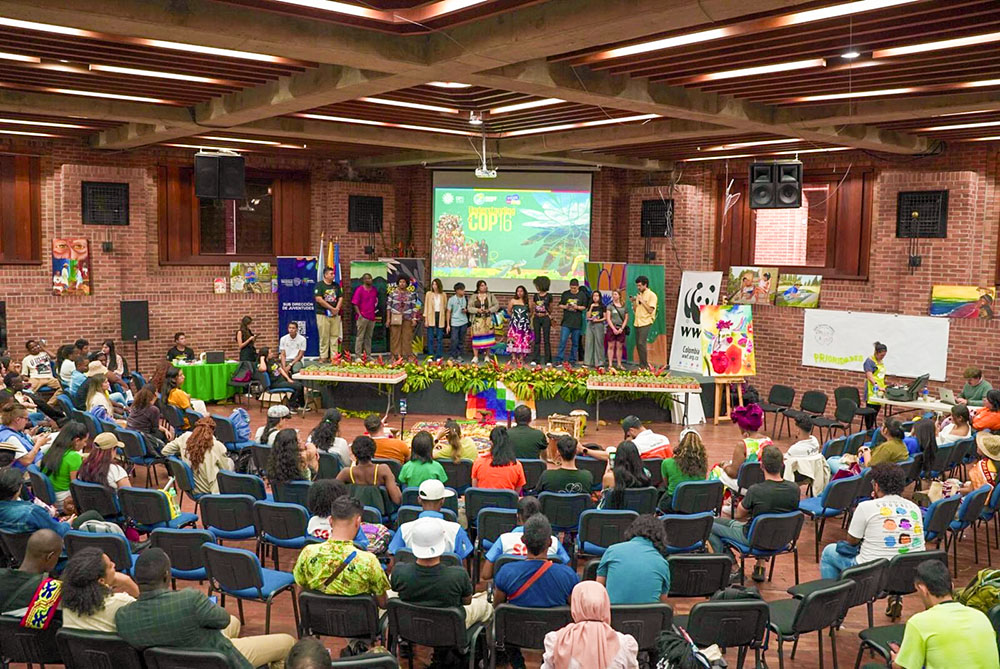
A global youth summit is held in the green zone of the 2024 United Nations biodiversity summit known as COP16, in Cali, Colombia. (Flickr/UN Biodiversity)
As of Oct. 21, 108 countries have announced new conservation targets aligned with the Global Biodiversity Framework goals, and 35 have submitted National Biodiversity Strategies and Action Plans detailing how they plan to meet them. More are expected as the summit moves forward.
Since 2020, the Faiths for Biodiversity coalition has led engagement of faith-based organizations in the biodiversity deliberations. In a COP16 policy statement, it stressed countries in Cali must deliver clear ambitious signs to implement the Global Biodiversity Framework.
That includes clear deadlines for updated biodiversity plans, a robust monitoring and reporting framework to track countries' progress, and more specific commitments around funding. Developed countries are 23% short of a $20 billion annual biodiversity fund they agreed to form at COP15 by 2025, according to the U.N. Convention on Biological Diversity.
"It's all about implementation," said Alexandra Goossens-Ishii, policy lead for the Faiths for Biodiversity coalition and program coordinator for environment, climate change and biodiversity with Soka Gakkai International, a Buddhist organization.
Faith groups are also focused on protecting human rights and greater involvement of Indigenous people in decision-making, and have urged countries to align national policies with biodiversity, climate change and land management.
"The social and environmental crisis that the planet is going through can only be effectively addressed from an integral and integrative ecological vision of the relationships between all human beings and the Nature that cohabit on earth," Martha Inés Romero, the Colombia-based secretary general of Pax Christi International, told EarthBeat in an email.
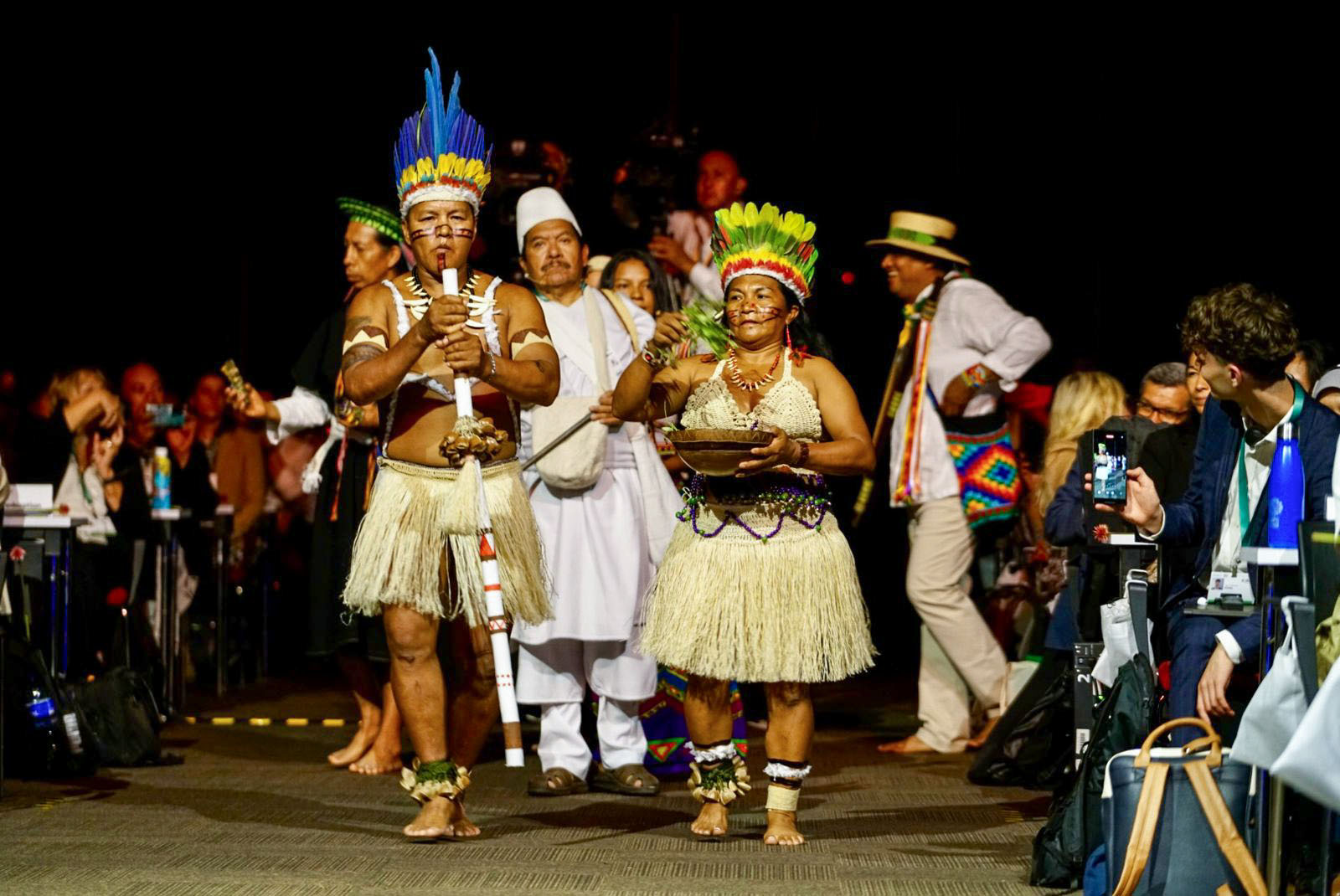
Indigenous people of Colombia take part in an opening ceremony Oct. 20 for the United Nations biodiversity summit known as COP16. Faith groups attending the two-week meeting in Cali have urged for Indigenous people to be included in conservation planning and decisions and their rights respected. (Flickr/UN Biodiversity)
The faith coalition has specifically called for no biodiversity offsetting, where voluntary conservation activities compensate for other activities that harm or destroy ecosystems. On climate change, offsets have been a popular way for businesses, as well as some churches, to reduce their carbon emissions but have faced increasing scrutiny for omitting local communities from decisions, misleading emissions-counting, and potentially allowing large polluters to continue polluting rather than reduce their emissions.
"We've seen the way that they can actually exacerbate the problems the offsets are trying to solve. So we don't want to see the biodiversity conference mechanisms being co-opted by these false solutions," Nelsen said.
Faith in conservation
Beyond policy, faith groups hope to make further inroads with countries and the biodiversity convention as a whole.
The coalition, which expects to have around 40 members in Cali, will again host a Faith Hub inside COP16's accredited "blue zone," where formal negotiations take place. Two dozen events are planned for the space, which will also host multifaith prayer and meditation daily.
The faith coalition expects to meet with Convention on Biological Diversity executive secretary Astrid Schomaker; the coalition met with the prior executive secretary in Montreal in 2022.
Faith leaders see those signs as progress, especially compared to the U.N. climate conferences where access is more challenging, and as recognition that countries are taking religion seriously as a factor in preserving biodiversity around the globe.
Advertisement
"That speaks a lot to how the CBD sees faith organizations as credible participants in the process. They can see that faith groups are doing the policy work and doing the grassroots work," said Amy Echeverria, international coordinator for justice, peace and integrity of creation with the Missionary Society of St. Columban.
The U.N. Environment Program's Faith For Earth Initiative estimates that religious communities globally oversee 8% of habitable lands and 5% of commercial forests. And with roughly 8 in 10 people worldwide associating with a religious tradition, faith leaders and their allies inside the U.N. see potential for an outsized role to play in revitalizing ecosystems.
At an event Oct. 21, the coalition highlighted the ways religious organizations have worked to implement the GBF in recent years.
Through the Faith & Ecosystem Restoration Project, led by WWF-UK, faith groups in southern Tanzania have identified 4,000 hectares of land for restoration and tree growing. Buddhist monks have led forest protection efforts in Cambodia's Sorng Rukhavoan Wildlife Sanctuary. Anglican churches in England have fostered native habitats in churchyards for the endangered hazel dormouse.
The Hima project in Jordan has worked to reverse overgrazing and desertification by stressing an ancient Islamic practice of setting aside land for conservation. And in the U.S., the Sisters of Loretto have used a conservation easement to permanently protect more than 650 acres of land at its Kentucky motherhouse.
A report from the coalition said that faith conservation efforts can be maximized by greater collaboration in policy, advocacy and conservation and education, and through technical and financial support of faith-led biodiversity projects.
Holy See and biodiversity
Outside the Faiths for Biodiversity coalition, the Vatican is expected to have representatives in Cali.
While Pope Francis has been outspoken in calling the world to unite in better caring for a common planetary home, the Holy See is one of two countries not party to the U.N. Convention on Biological Diversity, under which the Kunming-Montreal Global Biodiversity Framework was negotiated.
The other is the United States, which signed onto the convention in 1993 but it was never ratified in the U.S. Senate. Still, President Joe Biden has issued an executive order setting a national "30x30" goal.
The Holy See did not respond to requests for comment.
Having a delegation at COP16 is seen as progress for the Vatican compared to COP15, where its presence was mostly limited to the papal nuncio to Canada delivering a message on behalf of the pope.
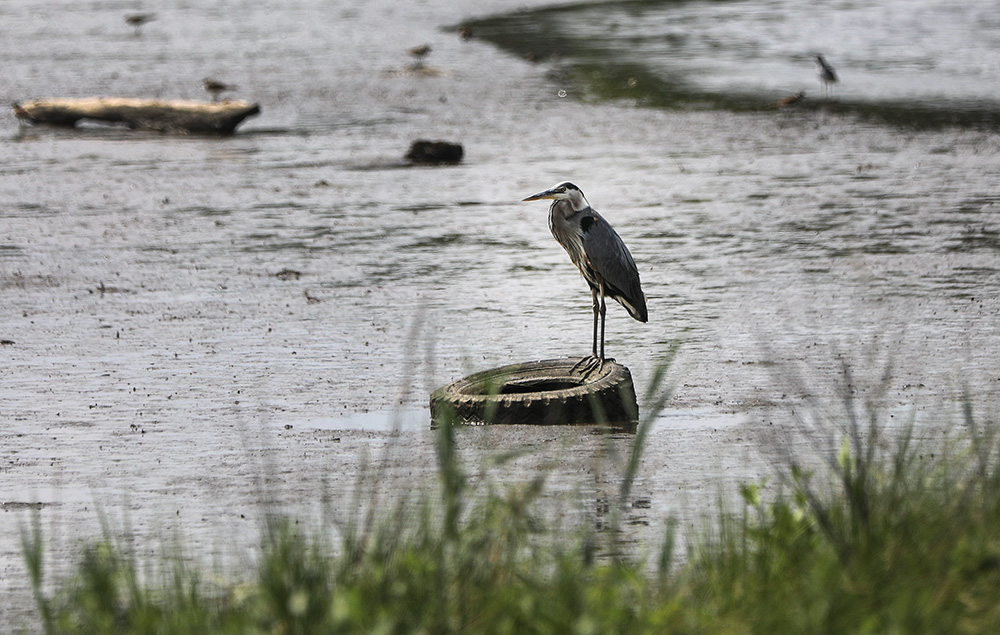
A heron is seen perched on a tire at low tide in a marsh area off the Chesapeake Bay in North Beach, Md., in this file photo. (CNS/Bob Roller)
Servite Fr. John Pawlikowski, part of the Faiths for Biodiversity coalition, said it would make sense for the Vatican to engage the biodiversity convention with the same vigor it has approached U.N. climate conferences, given the interconnectedness between the two ecological issues.
"Biodiversity has been such a central issue for the pope," he said, and has been emphasized as a "core element" in cultivating ecological spirituality and Vatican-led sustainability initiatives like the Laudato Si' Action Platform.
"By being an official part of the process … would be in answering this emphasis," said Pawlikowski, who is also a member of the climate action task force for the Parliament of the World's Religions.
As to how the faith coalition is viewing success at COP16, Goossens-Ishii said they want to see "strong momentum forward" from countries by announcing updated conservation plans and setting a deadline for future submissions. They'll also watch for how human rights and Indigenous rights are addressed.
Echeverria added that while it can be easy to become cynical with international political processes, she believes the faith community has a pastoral role to play in bringing compassion, solidarity and hope that countries can, and will, turn the tide in preserving the natural world.
"As faith people, we do live in long time. And so we have stamina," she said. "And I think that's something that's really needed at these meetings, is emotional, spiritual stamina to keep showing up and keep calling, regardless of the outcomes."
Editor's note: This article has been updated to clarify what biodiversity offsets are, and how offsets work.








